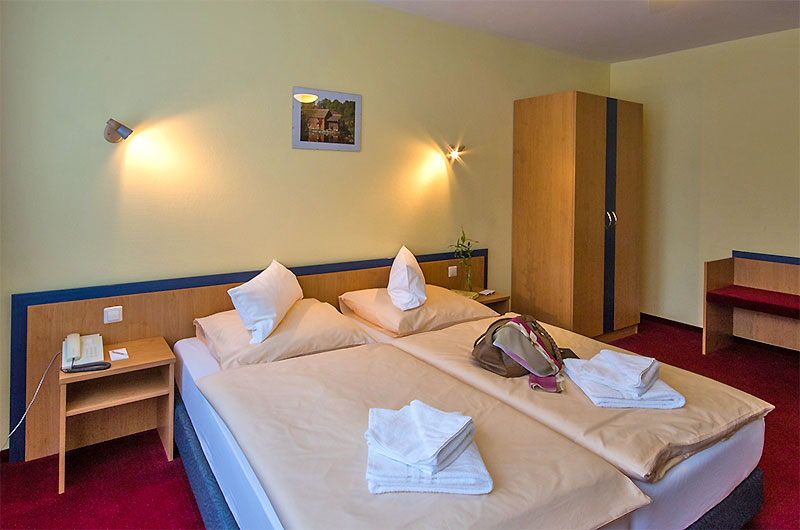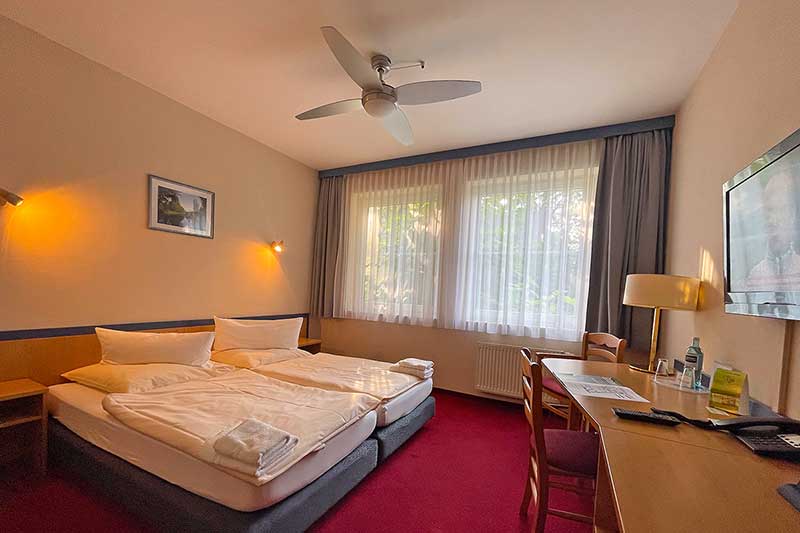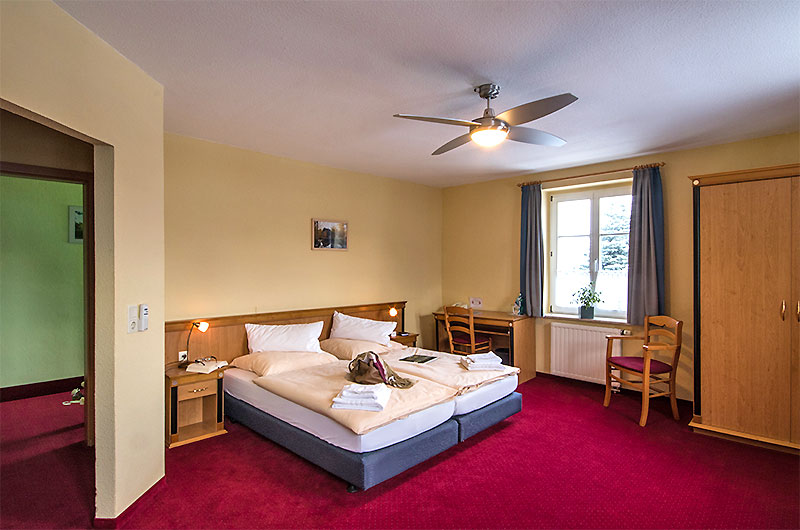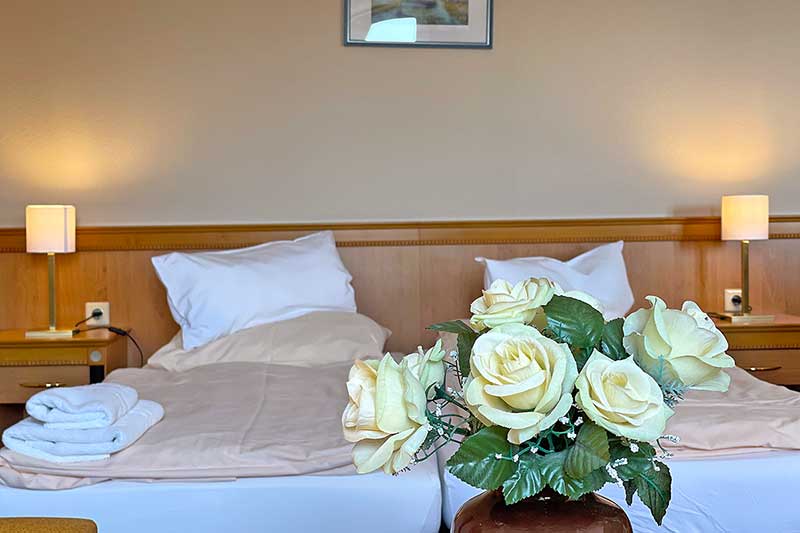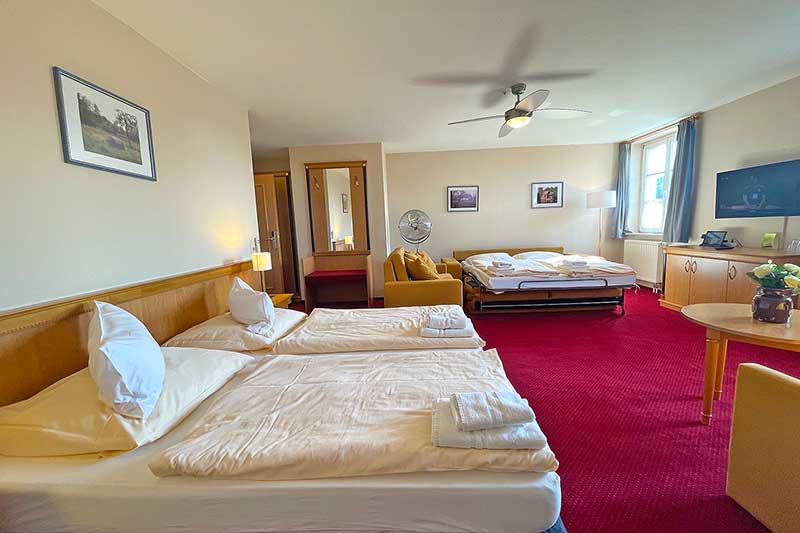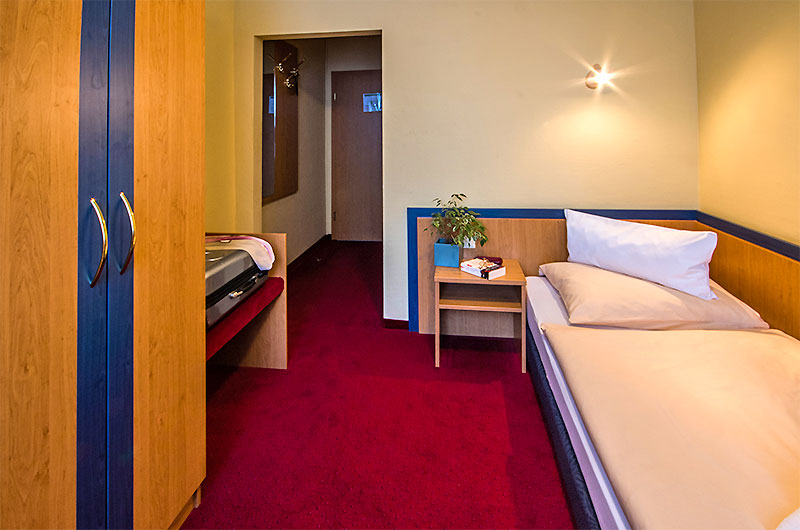
Single bedroom
- 13 sqm living space
- breakfast incl.
- Bathroom with toilet, shower
- Wi-Fi, TV, ceiling fan, insect screen
today „Hotel Radduscher Hafen“
The inn is one of the oldest buildings in Raddusch and used to have the house number 1. The tavern was built around 1542 as a half-timbered house made of clay and was originally thatched with straw. Later, the roof was covered with reeds. Since around 1503, Raddusch has been part of the Lordship of Lübbenau, under the lordship of the Schulenburg family. The inhabitants who took the oath of allegiance on behalf of the village community are recorded in the Lübbenau Chronicle. On April 13, 1702, it is noted that "Christian Müller, the current innkeeper," took the oath of allegiance for the village [16]. This wording suggests that there may have been another innkeeper (and thus an inn) before Christian Müller.
Around 1850, the sturdy structure of the inn was built, and the roof was covered with roof tiles. Before the 18th century, the inn belonged to the feudal landlord (also known as the half-landlord) Leopold Paulisch. This fiefdom included the Radduscher brickyard built in 1794, 400 acres of land, numerous other buildings in the area, as well as brewing rights. The industrious innkeeper Anne Marie Kemnitz delivered beer several times to Leipe ("Jank Kreppela") and to the Eiche Inn (Matthes Matzk) in 1803, even though she didn't have a license for it. A complaint from the Leipe innkeeper Bestro led to penalties for her and her customers, and she was warned that her liquor license could be revoked in case of repetition.
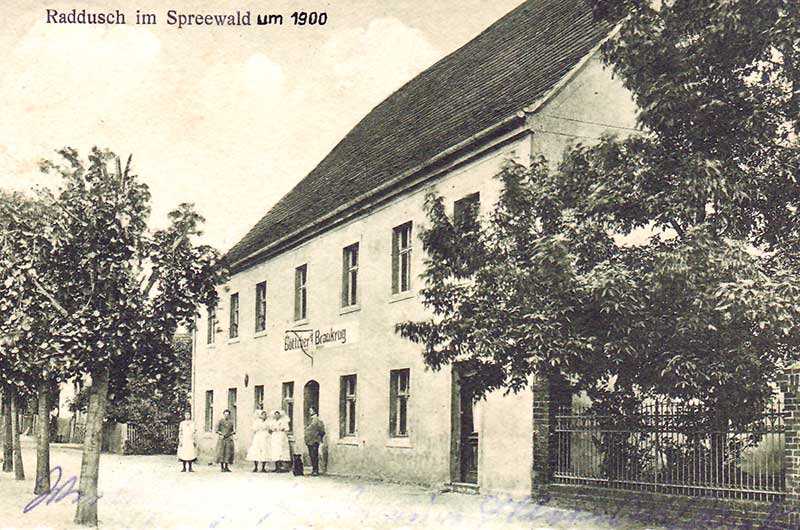
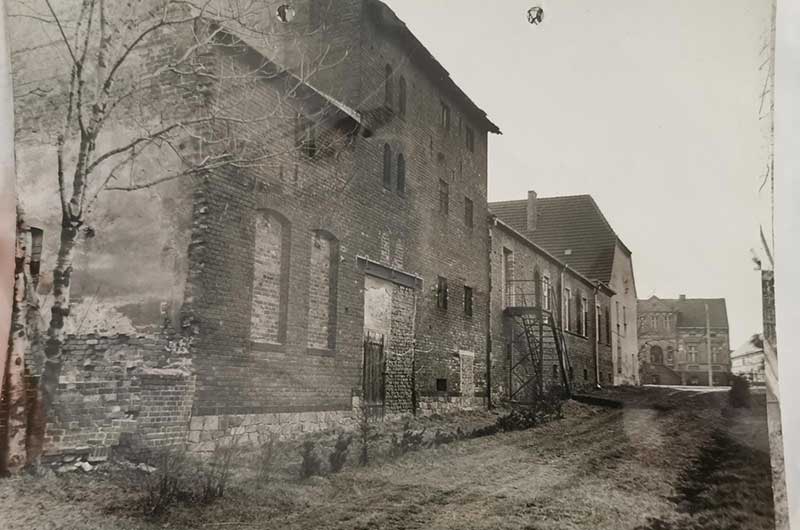
The inn was accompanied by a butcher shop and a brewery building. Until 1910, simple beer was brewed here, later malt and lager beer. Due to the new breweries that emerged in the vicinity of Raddusch, the competition had become too fierce. These breweries could produce beer more cheaply, so in 1910, the Raddusch Brewery ceased production. Nevertheless, the inn retained the name Braukrug to this day.
The inn was, like everywhere else in Raddusch, the center of intellectual and cultural life. This was also the case in the fateful years of 1791 and 1878, when large parts of the town were destroyed by fires and the inhabitants found their first refuge here. The inn was always the meeting place for the community leader and his representatives. Associations such as the Concordia Singing Society (founded in 1884), the cycling clubs Blitz and Solidarity (1902), the Volunteer Fire Department (1908), the Gymnastics Club (1926), the Veterans Association (1925), and the NSPAP (1934) had chosen the Braukrug inn as their club venue.
During an election event in 1924, there was a brawl in the hall between forces of the national-conservative Landbund and comrades of the SPD. The then district administrator had poured his hot coffee over political adversaries during a heated political debate. It took a year to repair the hall damages caused by the ensuing brawl between supporters and opponents.
Fritz Koal, born in 1923, recalls: "Back in the 1930s, us kids used to have our gym class in the hall. After each session, we had to put away the equipment next to the stage. Our gym teacher was August Trebus, a local from Raddusch. From my father's stories, I knew that around 1920, a weapons cache was discovered under the stage. Whoever had stashed the weapons there was never found out. When the Polish campaign began, fences were hastily erected in the courtyard of the inn, and a prisoner-of-war camp was set up. Polish soldiers worked on Raddusch farms during the day and were not guarded during that time. On New Year's Eve 1944, after being wounded, I was in Raddusch once again. In a separate room at Böttcher's inn, the village leaders and other dignitaries celebrated the transition to 1945. They invited me, a Messerschmitt pilot, to join them in the festivities. However, true merriment didn't quite take hold amidst the growing concerns."
Around 1920, several guest rooms were expanded to meet the increased demand, especially from the Berlin area. The fact that Raddusch is one of the few places with a railway connection had a positive impact on the development of tourism in the area.
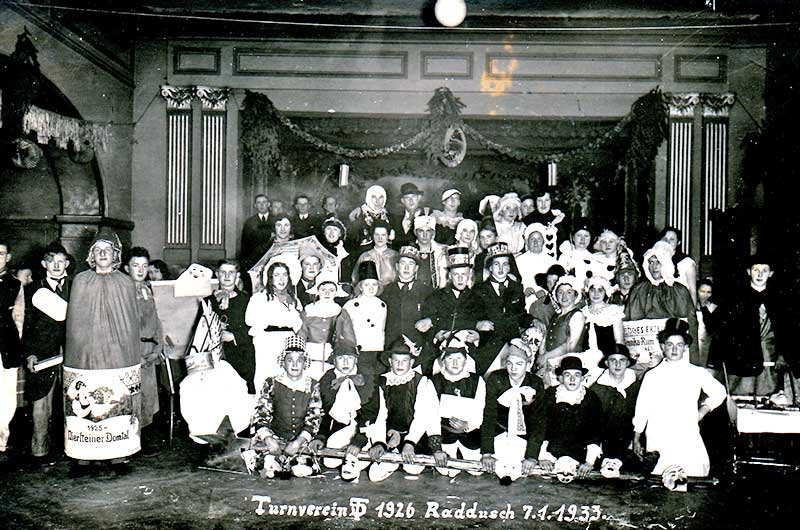
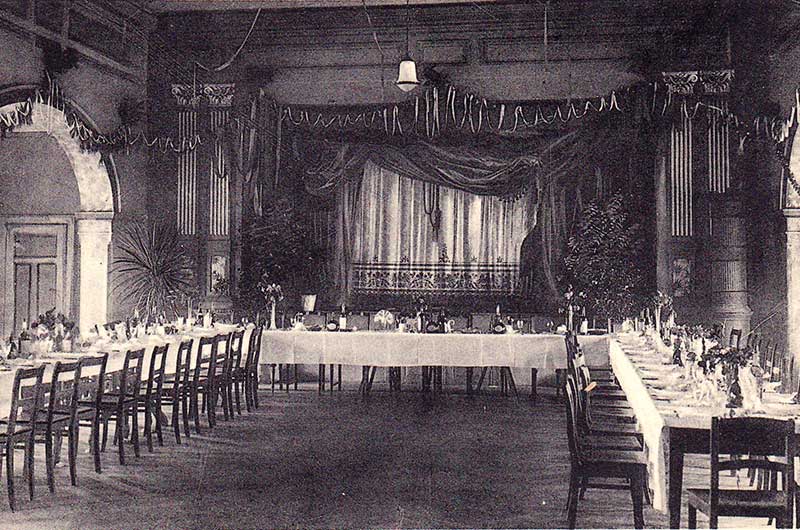
The inn had its own shooting range since 1935, which was used for small caliber shooting until 1945 by the Radduscher Veterans' Association and after 1945 until 1965 by the local chapter of the Free German Youth (FDJ) together with the Society for Sport and Technology (GST). After that, the shooting range was removed.
The beer mug remained the cultural-political center in the village even during GDR times. Thus, the Radduscher choir, the Radduscher sports club, the Radduscher village club, and the Domowina (League of Lusatian Sorbs) used the premises. Events such as choir gatherings, youth and men's carnival, spring, summer, Christmas, and New Year's Eve dance events, annual festivities of the sports club, the fire brigade, the village club, the local heritage and folk costume association, as well as those of political parties and mass organizations, local evenings, card game evenings, and rural cinema events were held here.
Some highlights after 1945 at the restaurant
Property manager or owner after 1945
The Böttcher family (originating from Krausnick) managed the establishment until 1948, and the Mierke family from 1948 to 1956. From 1956 onwards, the restaurant belonged to the consumer cooperative Calau/Lübben, with the managing families Noack, Duschka, Weber, Schimangk, Ast, and Ulbricht.
Joachim and Liselotte Ast took over the restaurant in 1976 and were employed by the consumer cooperative during that time. Liselotte Ast: "We received training beforehand at the Glaser restaurant in Göritz, my husband at the counter and I in the kitchen." They applied because the restaurant was in close proximity, making the commute to work just a few meters. For Lieselotte Ast, childhood and adolescent memories were also associated with the restaurant: she secretly watched the adults dancing through the hall window and always knew exactly who danced with whom how often. She still remembers the former owner, Böttcher: in the summer, he always wore a cornflower in his lapel. "We didn't want to miss the opportunity to take responsibility ourselves," recalls Liselotte Ast. What was planned for a longer period ended after just one year: the working conditions were too difficult, only drinks could be served, and a small snack offered. Only at dance events was there potato salad with hot dogs—a small permitted refreshment. Prices were uniform and could not be changed. "Beer cost 48 Pfennig, Pilsner 51, and hot dogs 85," Joachim Ast still remembers today. "On New Year's Eve, there was champagne with pineapple, the glass for 3.50 Marks. The canned pineapple was allocated by the Lübben fruit and vegetable trade." The low prices for alcohol ensured a consistently packed pub, but also occasionally led to a tipsy clientele. Property damage or the occasional heated disagreement among guests were inevitable. "That's not how we imagined the pub life, so we handed over the management," reflects Liselotte Ast on the year filled with rich experiences. "And I got to know the people of Raddusch better, especially regarding their tipping habits: from stingy to generous— the latter rarely happened in Raddusch!"
From 1988 to 1992, the house was operated as an LPG (Agricultural Production Cooperative) restaurant by the LPG Göritz/Belten. After the political turnaround, the restaurant is transformed into a GmbH (limited liability company), with Andreas Choschzik as its first managing director. In 1997, the restaurant is converted into a hotel with a bed house. The "Hotel zum Spreewaldhafen" is inaugurated in June 1998. It now has 38 double and 21 single rooms, with Marion Zirn as the managing director.
In October 2010, Torsten Seidel acquired the hotel. He had previously leased the Radduscher Hof located in the same street and was able to leverage the competitive situation to his advantage. Since then, the establishment has been named "Hotel Radduscher Hafen," with the attached restaurant called "Braukrug." The harbor hotel now boasts 9 single rooms, 52 double rooms, 2 junior suites, 1 triple room, 1 accessible room, and additional bedding options.
"The hotel has a tavern and a fireplace room, each with 40 seats, a vaulted cellar with 40 seats, and a banquet hall with 200 seats. The hotel grounds feature an idyllic beer garden within sight of the Radduscher Kahn ferry port. A conservatory was added to the ensemble in 2017."
Arrive, unpack, and feel right at home! You'll reside idyllically and close to nature, not far from the Radduscher Nature Harbor. When the sun rises above the trees in the morning and chirping birds announce the sunny day, even the late sleeper can't stay in bed any longer.

